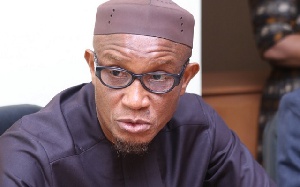Dr Mustapha Abdul-Hamid, the Minister of Inner City and Zongo Development, on Tuesday, said he would fight to his last breath to uphold the interest of Zongo people across the country should their rights be trampled upon in any way.
The Minister’s comments comes in the wake of increased reports of harassment of some Muslim nurses by their supervisors and senior nursing officers in certain government health facilities over the wearing of Hijab.
“Every day, I receive complaints from nurses from government health facilities complaining that their supervisors and senior nurses have asked them to either remove their Hijabs, or go home,” Dr Abdul-Hamid stated.
He cited a case where he personally went to the Mamobi Hospital to resolve such cases and even impressed upon Dr Anthony Nsiah-Asare, the Director-General of the Ghana Health Service to issue a statement.
Dr Abdul-Hamid made these remarks when he took his turn at the Meet-the Press series in Accra, on Tuesday.
The Minister, however, noted that despite the constant issuance of statements and reminders by the authorities of the Ghana Health Service instructing nursing supervisors not to prevent Muslim nurses from wearing the Hijab, some supervisors were still infringing on their rights to wear the veil.
“In this country, you cannot discriminate against people on the basis of their belief, ethnicity, gender, age or political party affiliation and I would like people to know that the President has given me the mandate to protect the interests of Zongo people so if their rights are trampled upon, I’m going to fight for those interests to the last breath of my life,” he assured.
His comments attracted spontaneous applause from some Muslim faithful at the meeting in apparent approval of his resolve.
The Minister explained that while wearing a Hijab was not a symbol of piety, it was one of identity.
The wearing of the veil, therefore, identified a Muslim woman from others, and the Constitution, which was the supreme law of Ghana, guaranteed them that religious right, he said.
Dr Abdul-Hamid cited Article 21(1) (C) of the 1992 Constitution, which stipulates that “every citizen of Ghana shall have the rights to profess the religion of his or her choice and to manifest it”.
“Nursing officers and mid-wives listening to me across the country should listen to me and listen good we are to subject to the 1992 Republican Constitution,” he stated.
“So, I want those nursing officers to tell me how can they identify a Muslim woman…how else can a Muslim woman manifest it…how do you identify a soldier without a uniform…how do we identify an Immigration Officer,” Dr Abdul-Hamid queried.
Narrating a scenario that occurred at the Accra Psychiatric Hospital, Dr Abdul-Hamid stated that on Sunday, January 27, this year, he received another complaint from a Muslim lady, Adisatu Ibrahim, who worked as a Ward Assistant at the Psychiatric Hospital that she had been demoted for wearing the Hijab to work.
The Minister said the Deputy Director of the Nursing Services at the Hospital gave a flimsy excuse that the lady had been warned not to wear the Hijab because the facility was a mental facility and wearing the veil could pose security risk to her because Adisatu could be attacked by a mental patient.
Dr Abdul-Hamid explained that the President was very uncompromising as far as the integration of the Ghanaian society was concerned and had directed that there should not be any discrimination of any sort.
The Minister said upon the pursuit of Adisatu’s case with Dr Akwasi Osei, the Director-General of the Ghana Mental Authority, the body under which the Accra Psychiatric Hospital operated, she was restored to her former position.
General News of Wednesday, 30 January 2019
Source: ghananewsagency.org













